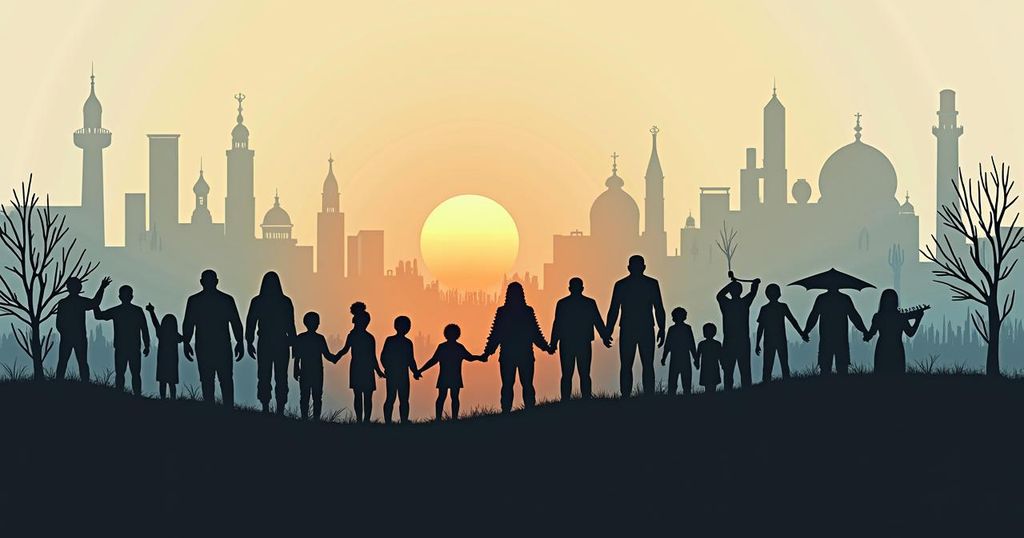Azerbaijan’s hosting of the UN climate talks is overshadowed by allegations of human rights abuses, particularly targeting activists and ethnic Armenians. Human Rights Watch and Freedom Now report an increasing crackdown on dissent ahead of the COP29 negotiations, with calls for the release of political prisoners from U.S. lawmakers. While Azerbaijan defends its human rights practices, international scrutiny intensifies, emphasizing the need for inclusive dialogue in climate discussions.
Azerbaijan faces significant criticism regarding its human rights practices as it prepares to host the upcoming United Nations climate negotiations. Activists and U.S. lawmakers are urging the Azerbaijani government to address ongoing allegations of civil society repression, including actions against ethnic Armenians and government dissenters, especially in light of a recent report from Human Rights Watch and Freedom Now. This report highlights a troubling trend of escalating arrests and crackdowns on activists, such as Anar Mammadli, a prominent advocate for climate justice, who was detained this past spring. The appeal from U.S. lawmakers to Secretary of State Antony Blinken emphasizes the upcoming COP29 climate talks as a critical platform for advocating energy security and addressing human rights concerns in the region, particularly following allegations of ethnic cleansing in Nagorno-Karabakh. A State Department report corroborates claims of “significant human rights issues” in Azerbaijan, documenting arbitrary detentions and other violations. Myrto Tilianaki from Human Rights Watch has stated, “When civic space is actively shut down, the voices of those most affected by the climate crisis are at risk of being excluded from the negotiations,” highlighting the necessity of inclusive dialogue in climate discussions. Despite these severe allegations, Azerbaijan’s embassy in Washington has contested the accusations, declaring that the ongoing legal processes are being executed lawfully and dismissing the claims as part of a planned disinformation campaign against the nation. The embassy asserted that Azerbaijan’s selection as a host for the climate talks underscores its role as a responsible member of the international community. The Human Rights Watch report details that recent arrests of activists in Azerbaijan are largely a result of restrictive laws governing non-governmental organizations. Many detainees have faced allegations of financial crimes, suggesting that these charges may serve as a guise to suppress political opposition rather than reflect genuine legal infractions. Notably, Gubad Ibadoghlu, an economist and vocal critic of the Azerbaijani government, has been arrested on charges related to counterfeiting and extremism. His advocacy for transparency in the management of the nation’s oil revenues has positioned him at odds with authorities, and he may face a lengthy prison sentence if convicted. Azerbaijan’s participation in climate talks occurs against a backdrop of global calls for a transition away from fossil fuels, yet the government insists that it can contribute to climate targets while continuing fossil fuel production, a crucial revenue source for the nation. President Ilham Aliyev has characterized the nation’s oil and gas resources as “a gift from God” and emphasized the importance of utilizing these resources for national development rather than facing condemnation for their existence. The complexities surrounding Azerbaijan’s hosting of the COP29 talk intertwine concerns of environmental policy with pressing human rights issues, posing significant challenges for negotiators committed to inclusive climate solutions.
As Azerbaijan prepares to host a major global conference on climate change, its internal human rights issues have come under intense scrutiny. Recent reports indicate that the Azerbaijani government is engaging in a systematic crackdown on dissent, impacting NGOs, activists, and ethnic minorities, particularly amid ongoing geopolitical tensions in the region. The rising attention to human rights violations in Azerbaijan is further complicated by the country’s strategic importance as an oil and gas producer, creating a dichotomy between energy security and human rights advocacy.
In conclusion, Azerbaijan’s role as host for the COP29 climate negotiations is fraught with tension due to its controversial human rights record. The calls for reform from U.S. lawmakers and global activists underscore the need for accountability in the face of allegations concerning civil liberties abuses. Critically, the incorporation of diverse voices in climate discussions is imperative to ensure that policy outcomes reflect both environmental goals and protective measures for human rights.
Original Source: www.wprl.org






